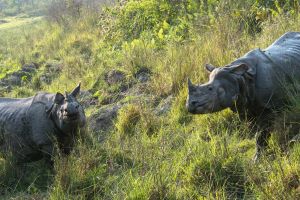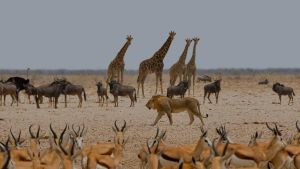
Different types of ecology include molecular ecology, organismal ecology, population ecology, community ecology, global ecology, landscape ecology, ecosystem ecology and human ecology.
Here is a detailed explanation of different types of ecology:
Table of Contents
Molecular ecology
Molecular ecology is the study of organisms and abiotic factors on a molecular level. It uses molecular biology and molecular genetics to find answers to ecological questions on a molecular level.
Organismal ecology
Organismal ecology deals with the study of interactions between organism and their environment. It also focuses on the physiological and behavioral adaptations of an organism to it’s external environment.
Population ecology
Population ecology deals with the study of different organisms living as a population. The dynamics of the species population are discussed under this subfield of ecology.
Community ecology
Community ecology studies organisms on a community level. The studies include interaction of populations, their organization, and functioning in the ecosystem.

Global Ecology
Global ecology studies the interactions between the different earth’s ecosystems such as land, atmosphere, and water. Global ecology is an important field in ecology because it is used to study macro interactions and how they influence the behavior of the entire globe.
Landscape ecology
Landscape ecology is best described as the study of patterns and interactions between populations living in more than one ecosystem.
Ecosystem ecology
Ecosystem ecology studies the interrelationship among biotic and abiotic factors of an ecosystem.
Human Ecology
Human ecology deals with the relationship between human and their natural, behavioral and social environment. It includes the study of human life and activity in various ecosystems to gain insights of the factors that influence the whole environment.
Branches of ecology
Branches of ecology includes:

- Terrestrial ecology
- Aquatic ecology
- Microbiology ecology
- System ecology
- Taxonomic ecology
- Evolutionary ecology
- Conservation ecology
- Applied ecology
Here is a overview of each branch of ecology:
Terrestrial Ecology
Terrestrial ecology is the study of land-based ecosystems, including their populations and communities of plants, animals, and microorganisms, along with their interaction with the atmosphere, streams, and groundwater.
Aquatic Ecology
Aquatic ecology deals with the study of animals and plants living in the aquatic environment. The two main types of aquatic ecosystems are marine ecosystems and freshwater ecosystems.
Microbial Ecology
Microbial ecology is the study of the diversity, distribution, and abundance of microorganisms, as well as their unique interactions and effects on ecosystems. It deals with the study of microorganisms and their interactions among themselves and their environment.
Systems Ecology
Systems ecology is a method of studying ecosystems that are based on formal systems thinking, synthesis, ecological view, and modeling processes. Its objectives are to build and test ecosystem organization theory, discover and control emergent features, and forecast disturbance reactions
Taxonomic Ecology
Taxonomic ecology is the scientific study of identifying, defining, and categorizing biological entities into groups, based on similar traits. For example, based on taxonomic ecology, living organisms are categorized into Kingdom, Phylum, Class, Order, Family, Genus, and Species.
Evolutionary Ecology
Evolutionary ecology deals with the factors that cause species to undergo change due to natural selection and evolution.
Ecology is related to evolution as natural selection can be influenced by ecological processes such as species interactions and environmental changes. Ecology is important to examine environmental elements that influence a species’ ability to adapt.
Conservation Ecology
Conservation ecology is concerned with the preservation and management of biodiversity and natural resources.
Applied Ecology
Applied ecology is a branch of ecology that looks at how the science of ecology might be applied to real-world problems. It also deals with ecological principles and characteristics of ecology.
Define the scope of population ecology

The scope of population ecology is defined as the study of environmental influences on population density and distribution, age structure, and population size variations. It has an impact on many forms of organisms living in a population.
Population ecology is influenced by an ecological change which is defined as change or disturbance in the environment or a change in ecological processes caused by human activity.
Why are there different types of ecology
There are different types of ecology because of the complexity of various ecosystems. The study of ecological complexities gets easier when they are broken down into different levels.
Although, all the types are interrelated by basic principles, there are are various factors that cannot be understood while studying on one single level. For example, while studying a population as a whole, an ecologist may miss any changes in the species level that might affect the whole population.
FAQ
What are the different types of ecology?
The different types of ecology are molecular ecology, organismal ecology, population ecology, community ecology, global ecology, landscape ecology, ecosystem ecology and human ecology.
list the three different types of ecology
The three different types of ecology are:
- organismal ecology
- population ecology
- community ecology